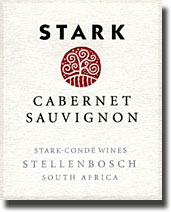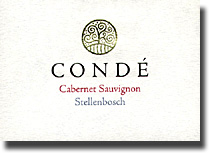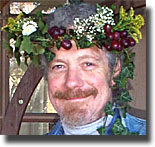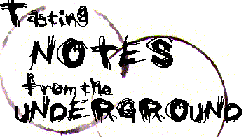|
|

 tark-Condé
is hardly a household name in the US, much less around here in metro
Day-twah. I’d barely ever heard of this South African wine
producer until I did some research on
MAN Vintners
recently, and discovered that José Condé
(1/3 of the triumvirate of partners in that project) is the
owner-winemaker. Upon further investigation, I learned that Stark-Condé
is a family-run boutique operation whose total output is less than 5,000
cases a year, and produces only red wines. There are two levels of
production; the Condé line is made up of single vineyard bottlings
sourced from their best vineyard blocks, while the lower priced Stark
line (named after a now-deceased family matriarch) are blended from more
than one vineyard. The wines at both levels are made in the same manner,
with hand-sorting, open-top fermentations, hand punchdowns and manual
basket pressing. tark-Condé
is hardly a household name in the US, much less around here in metro
Day-twah. I’d barely ever heard of this South African wine
producer until I did some research on
MAN Vintners
recently, and discovered that José Condé
(1/3 of the triumvirate of partners in that project) is the
owner-winemaker. Upon further investigation, I learned that Stark-Condé
is a family-run boutique operation whose total output is less than 5,000
cases a year, and produces only red wines. There are two levels of
production; the Condé line is made up of single vineyard bottlings
sourced from their best vineyard blocks, while the lower priced Stark
line (named after a now-deceased family matriarch) are blended from more
than one vineyard. The wines at both levels are made in the same manner,
with hand-sorting, open-top fermentations, hand punchdowns and manual
basket pressing.
I had no idea what to expect when we took possession of six bottles from
Stark-Condé for review a few weeks ago, but we soon discovered that this
is an outfit to be reckoned with. We started our survey with the
Syrahs. All prices listed are average retail per bottle as listed by
Stark-Condé importer
Vineyard Brands, Inc., Birmingham, AL.
2004 Stark Stellenbosch
Syrah, $26, 14 % alc.: Dark garnet in color, fading to pink at the
rim, with expressive smoke, toast, coffee and tar over dark plums and
berries on the nose; the rich flavors echo loudly on a well structured,
full bodied frame. With an hour’s worth of air, the somewhat burry
tannins smooth out nicely, making for a fine glass of Syrah that pairs
well now with a plate of lamb tagine. It’ll show even better with at
least a few more years in the bottle, and quite probably well beyond
that. A blend from two different vineyards from Condé-Stark’s Oude
Nektar farm in Jonkershoek Valley, with full malolactic
fermentation and 22 months in French oak, mostly 2nd year, with about
15% new. Bottled unfined and unfiltered. Find this wine
|
|
2004 Condé Stellenbosch Syrah, $35, 14 % alc.: This almost looks like purple-garnet ink in the glass; although a little
stingy, it offers a well integrated kiss of sweet oak that complements
the deep, dark plum and berry on the nose, all of which echoes
and expands dramatically on the palate. Not exactly sweet, or even ripe, but
certainly rich, full flavored and harmonious, with an additional shading
of soft leather that becomes accentuated with air and sets the tone for
the personality of the wine. Well structured (but not so much so that
you can’t enjoy it now with some air and more of that tasty lamb tagine),
with good length, this is well worth the tariff, and it will continue to
develop over the next five years and beyond. From Condé’s highest
elevation Syrah vineyard located at the Oude Nektar farm in Jonkershoek
Valley, with full malolactic fermentation and 22 months in French oak,
mostly 2nd year, with about 15% new. Bottled unfined and unfiltered. Find this wine
I made the mistake of pouring the 2003 Cabernet Sauvignons in the wrong
order, but it was an instructive error, and impressions are presented in
the order that they were tasted.
 2003
Condé Stellenbosch Cabernet Sauvignon, $35-40, 15% alc.: Dark garnet
in color, with lovely flavors and aromas of cassis, black currant and
blackberry, accented with some subtle toast and coffee, and hints of
earth and fennel. Smoothly textured and medium full bodied, with good,
but not excessive extraction, this is deceptively well structured, with
fine tannins and enough acidity to make it come together nicely. A wine
of elegance, with good promise for further development, and yet it
drinks so well already, especially with a plate of grilled medium rare
beef as the fruit sweetens with some air. It doesn’t exactly scream
Cabernet, but then, it’s not really atypical either; what it IS is
eminently drinkable, and I’d love to get my hands on more of this for
both current consumption and cellaring for some years down the road.
This one really wowed me. From Block 5 at the Oude Nektar farm in
Jonkershoek Valley, with full malolactic fermentation and 22 months in
mostly new French oak. Bottled unfined and unfiltered. Find this wine 2003
Condé Stellenbosch Cabernet Sauvignon, $35-40, 15% alc.: Dark garnet
in color, with lovely flavors and aromas of cassis, black currant and
blackberry, accented with some subtle toast and coffee, and hints of
earth and fennel. Smoothly textured and medium full bodied, with good,
but not excessive extraction, this is deceptively well structured, with
fine tannins and enough acidity to make it come together nicely. A wine
of elegance, with good promise for further development, and yet it
drinks so well already, especially with a plate of grilled medium rare
beef as the fruit sweetens with some air. It doesn’t exactly scream
Cabernet, but then, it’s not really atypical either; what it IS is
eminently drinkable, and I’d love to get my hands on more of this for
both current consumption and cellaring for some years down the road.
This one really wowed me. From Block 5 at the Oude Nektar farm in
Jonkershoek Valley, with full malolactic fermentation and 22 months in
mostly new French oak. Bottled unfined and unfiltered. Find this wine
2003 Stark Stellenbosch Cabernet Sauvignon,
$27, 14.5% alc.: Not in the same league as the ’03 Condé, but still,
a nice glass of wine when considered on its own. Ruby dark garnet in
color, with ever-so-slightly vegetal black currant and blackberry
flavors and aromas that show notes of soft new leather, tobacco and a
subtle earthy undertone. Medium full bodied and well balanced, with
fairly rich fruit, smooth, fine tannins, and good length on the finish.
Like the ’03 Condé, the velvety texture is very impressive, and really,
the only thing wrong with this is that it was tasted after, rather than
before the previous selection. It offers good value for the money, and
drinks well on the second day, with the soft leather character even more
accentuated. A blend from four different vineyards from Condé-Stark’s
Oude Nektar farm in Jonkershoek Valley, with full malolactic
fermentation and 22 months in French oak, 40% of which was new. Bottled
unfined and unfiltered. Find this wine
Having learned my lesson with the ‘03s, we tried the ’04 Cabernets in
the proper order.
2004 Stark Stellenbosch Cabernet Sauvignon,
$27, 14% alc.: Dark garnet in color, with a note of cocoa over black
currant-cassis, and shaded with hints of tobacco, this shows the same
smooth, lovely texture that the ‘03s do, being well balanced with rich
fruit, moderate tannins, just enough acidity and good length. The
“cocoa” sets the tone here, emerging more with air; it doesn’t have the
leathery quality that the ’03 has, and it’s not terribly complex, but
it’s harmonious and quite enjoyable for what’s here. A blend from four
different vineyards from Condé-Stark’s Oude Nektar farm in Jonkershoek
Valley, with full malolactic fermentation and 22 months in French oak,
40% of which was new. Bottled unfined and unfiltered. Find this wine
2004 Condé Stellenbosch Cabernet Sauvignon,
$41.50, 14.47% alc.: Dark garnet in color from rim to rim, and all
toast on the nose, with flavors of toasty oak over black currant on a
medium full to full bodied frame; the typically smooth texture masks the
deceptive structure here, but this is not the equal of the ’03 Condé
Cabernet, lacking the depth, and for me, the appeal, seeming almost lean
by comparison. Just when I was about to sing the universal praise of
this producer, this wine comes along and brings me back down to earth a
bit. Maybe it’ll put on some weight and maybe the now-dominant oak will
integrate with some time in the bottle, but as it is now, I’d opt for
the ’04 Stark Cabernet. From Block 5 at the Oude Nektar farm in
Jonkershoek Valley, with full malolactic fermentation and 22 months in
French oak, about 75% new, with the balance second fill. Bottled unfined
and unfiltered. Find this wine
To be fair, it seems pretty obvious from these two pairs of cabs that
2003 was simply a better vintage than ’04, since both of the ‘03s have a
little more of everything going for them. It also seems pretty obvious
that José Condé and family are producing some very exciting wines, all
things considered. Stark-Condé may have flown beneath our radar only a
month ago, but we’ll be paying a lot closer attention to them in the
future.
Reporting from Day-twah,
Bastardo

Other Recent Wine Explorations
8 From Qupé
Following Up
With Fisher, Ladera and Schweiger
QPR All Stars: MAN Vintners
& Marqués de Cáceres
12 From the
Perrin Family
Harvest Images from Berthet-Rayne
Wicked Couch & Spit
Back to November '06 Index
Back to the Underground
Index
Back to the Top


© George Heritier November, 2006
|






